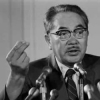S. I. Hayakawa

S. I. Hayakawa
Samuel Ichiye "S. I." Hayakawawas a Canadian-born American academic and politician of Japanese ancestry. He was an English professor, and served as president of San Francisco State University and then as United States Senator from California from 1977 to 1983...
NationalityAmerican
ProfessionPolitician
Date of Birth18 July 1906
CountryUnited States of America
S. I. Hayakawa quotes about
cannot good kinds life lived lives people true
In a real sense, people who have read good literature have lived more than people who cannot or will not read. It is not true that we have only one life to live; if we can read, we can live as many more lives and as many kinds of lives as we wish.
littles chance individual
It is the individual who knows how little they know about themselves who stands the most reasonable chance of finding out something about themselves before they die.
philosophy selfish struggle
People who think of themselves as tough-minded and realistic, among them influential political leaders and businessmen as well as go-getters and hustlers of smaller caliber, tend to take it for granted that human nature is selfish and that life is a struggle in which only the fittest may survive. According to this philosophy, the basic law by which man must live, in spite of his surface veneer of civilization, is the law of the jungle. The "fittest" are those who can bring to the struggle superior force, superior cunning, and superior ruthlessness.
country bilingualism individual
Bilingualism for the individual is fine, but not for a country.
party writing order
You just don't know anything unless you can write it. Sure you can argue things out in your own head and bring them out at parties, but in order to argue anything thoroughly, you must be able to put it down on paper.
education children believe
The traditional educational theory is to the effect that the way to bring up children is to keep them innocent (i.e., believing in biological, political, and socioeconomic fairy tales) as long as possible ... that students should be given the best possible maps of the territories of experience in order that they may be prepared for life, is not as popular as might be assumed.
important age substance
In the age of television, image becomes more important than substance.
grandfather maps lasts
The last thing a scientist would do is cling to a map because he inherited it from his grandfather, or because it was used by George Washington or Abraham Lincoln.
race color america
America is an open society, more open than any other in the world. People of every race, of every color, of every culture are welcomed here to create a new life for themselves and their families. And what do these people who enter into the American mainstream have in common? English, our shared common language.
philosophical giving society
If everybody is rewarded just for being alive, you get the same sort of effect as you do when you reward every student just for being enrolled. You destroy not only education, you destroy society by giving A's to everyone. This is a philosophical consideration that bothers me very much as I sit in the United States Senate and see the great budget allocations going through.
education teacher teaching
Good teachers never say anything. What they do is create the conditions under which learning takes place.
agreement people mind
Agreement is brought about by changing people's minds - other people's.
funny-inspirational mind speak
I'm going to speak my mind because I have nothing to lose.
struggle animal clothes
Animals struggle with each other for food or for leadership, but they do not, like human beings, struggle with each other for thatthat stands for food or leadership: such things as our paper symbols of wealth (money, bonds, titles), badges of rank to wear on our clothes, or low-number license plates, supposed by some people to stand for social precedence. For animals the relationship in which one thing stands for something else does not appear to exist except in very rudimentary form.